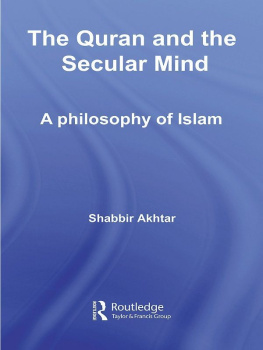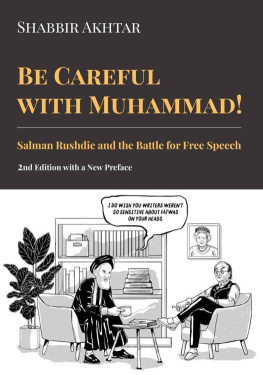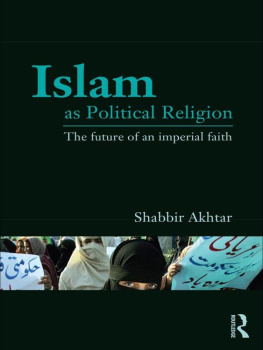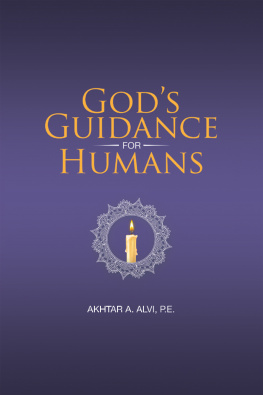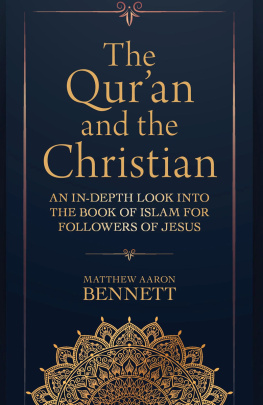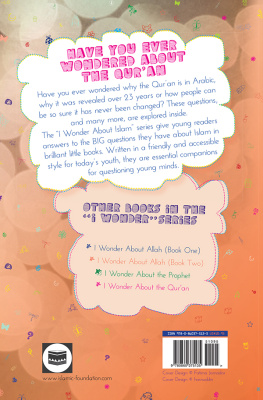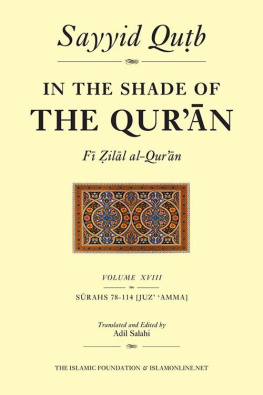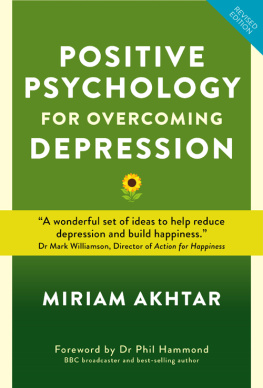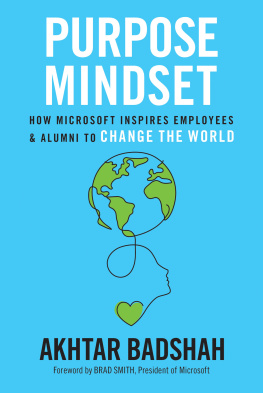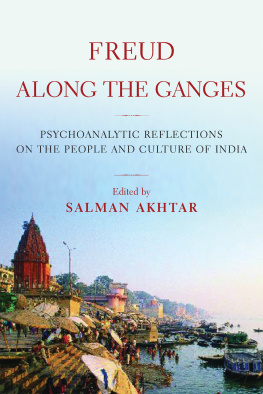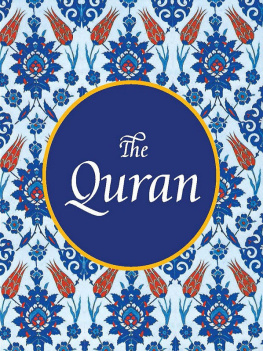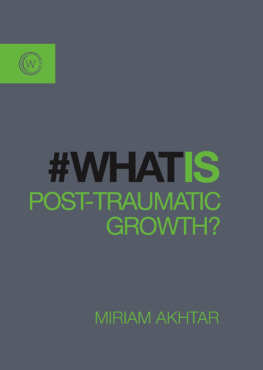Shabbir Akhtar - The Quran and the Secular Mind
Here you can read online Shabbir Akhtar - The Quran and the Secular Mind full text of the book (entire story) in english for free. Download pdf and epub, get meaning, cover and reviews about this ebook. year: 2007, publisher: Taylor and Francis, genre: Religion. Description of the work, (preface) as well as reviews are available. Best literature library LitArk.com created for fans of good reading and offers a wide selection of genres:
Romance novel
Science fiction
Adventure
Detective
Science
History
Home and family
Prose
Art
Politics
Computer
Non-fiction
Religion
Business
Children
Humor
Choose a favorite category and find really read worthwhile books. Enjoy immersion in the world of imagination, feel the emotions of the characters or learn something new for yourself, make an fascinating discovery.
- Book:The Quran and the Secular Mind
- Author:
- Publisher:Taylor and Francis
- Genre:
- Year:2007
- Rating:5 / 5
- Favourites:Add to favourites
- Your mark:
- 100
- 1
- 2
- 3
- 4
- 5
The Quran and the Secular Mind: summary, description and annotation
We offer to read an annotation, description, summary or preface (depends on what the author of the book "The Quran and the Secular Mind" wrote himself). If you haven't found the necessary information about the book — write in the comments, we will try to find it.
The Quran and the Secular Mind — read online for free the complete book (whole text) full work
Below is the text of the book, divided by pages. System saving the place of the last page read, allows you to conveniently read the book "The Quran and the Secular Mind" online for free, without having to search again every time where you left off. Put a bookmark, and you can go to the page where you finished reading at any time.
Font size:
Interval:
Bookmark:
In this engaging and innovative study Shabbir Akhtar argues that Islam is unique in its decision and capacity to confront, rather than accommodate, the challenges of secular belief. The author contends that Islam should not be classed with the modern JudaeoChristian tradition since that tradition has effectively capitulated to secularism and is now a disguised form of liberal humanism. He insists that the Quran, the founding document and scripture of Islam, must be viewed in its own uniqueness and integrity rather than mined for alleged parallels and equivalents with biblical Semitic faiths.
The author encourages his Muslim co-religionists to assess central Quranic doctrine at the bar of contemporary secular reason. In doing so, he seeks to revive the tradition of Islamic philosophy, moribund since the work of the twelfth century Muslim thinker and commentator on Aristotle, Ibn Rushd (Averros). Shabbir Akhtars book argues that reason, in the aftermath of revelation, must be exercised critically rather than merely to extract and explicate Quranic dogma. In doing so, the author creates a revolutionary form of Quranic exegesis with vitally significant implications for the moral, intellectual, cultural and political future of this consciously universal faith called Islam, and indeed of other faiths and ideologies that must encounter it in the modern secular world.
Accessible in style and topical and provocative in content, this book is a major philosophical contribution to the study of the Quran. These features make it ideal reading for students and general readers of Islam and philosophy.
Shabbir Akhtar is Assistant Professor of Philosophy at Old Dominion University in Norfolk, Virginia, USA. He has taught in the International Islamic University in Malaysia and has published widely on Islam, Christianity and current affairs.

First published 2008
by Routledge
2 Park Square, Milton Park, Abingdon, Oxon OX14 4RN
Simultaneously published in the USA and Canada
by Routledge
270 Madison Avenue, New York, NY 10016
This edition published in the Taylor & Francis e-Library, 2007.
To purchase your own copy of this or any of Taylor & Francis or Routledges collection of thousands of eBooks please go to www.eBookstore.tandf.co.uk.
Routledge is an imprint of the Taylor & Francis Group, an informa business
2008 Shabbir Akhtar
All rights reserved. No part of this book may be reprinted or reproduced or utilized in any form or by any electronic, mechanical, or other means, now known or hereafter invented, including photocopying and recording, or in any information storage or retrieval system, without permission in writing from the publishers.
British Library Cataloguing in Publication Data
A catalogue record for this book is available from the British Library
Library of Congress Cataloging in Publication Data
A catalog record for this book has been requested
ISBN 0-203-93531-4 Master e-book ISBN
ISBN 10: 0-415-43782-2 (hbk)
ISBN 10: 0-415-43783-0 (pbk)
ISBN 10: 0-203-93531-4 (ebk)
ISBN 13: 978-0-415-43782-0 (hbk)
ISBN 13: 978-0-415-43783-7 (pbk)
ISBN 13: 978-0-203-93531-6 (ebk)
To Nabeel and Foziea
abbreviations
I have followed the Library of Congress system for Arabic transliteration. I retain the final h to indicate feminine nouns. Arabic has no upper case but I have capitalized proper nouns and the initial word in transliterated titles of Arabic works. Some words can occur with an upper case (Al-Qurn) and a lower case (qurn). This is explained in the text. Elision of vowels is not indicated.
Words such as Shiite are now naturalized into English. In such words, the length of vowel, any diacritical dots, and glottal () and guttural () stops are not indicated. Other naturalized words include Islam, Quran, Ramadan, Muhammad, fatwa, jihad, and so on.
Abbreviations: References to the Quran are given in the text and are set apart by the use of a capital Q followed by the number of the chapter and verse. This is explained in . Other abbreviations used are standard.
I have used inclusive language even at the expense of style. In a few cases, however, I could not avoid traditional language. For example, the Quran recognizes only men as prophets. It would be contrived to use gender-neutral language in such a discussion. Again, the Qurans discussion of human nature uses the male as a prototype.
The aim of this book is to investigate the rationality and plausibility of traditional Muslim conviction, a conviction inspired by the Quran, the founding document and scripture of Islam. The context of our largely philosophical investigation is supplied by industrialized and secularized western and westernized societies. This ambitious task has not been attempted by any Muslim or non-Muslim analytical philosopher in our times. One book cannot fully address this problem but it can articulate the anxiety and thus create a framework for a dialogue between the interested parties. The vaguely felt Muslim sense of intellectual unease in the secular world is here reduced to the precise project of developing tools for assessing, somewhat obliquely at times, the rationality of Islamic conviction.
This essay is partly a philosophical contribution to the study of the Quran: a critical commentary on some controversial, that is, philosophically vulnerable, assumptions of the Muslim scripture. Although the Quran has stimulated an exegetical literature comparable in size and sophistication to New Testament exegesis and to rabbinic commentary on the Hebrew Bible, modern philosophers have not probed its central claims. Why should exegesis be an exclusively theological discipline rather than a form of reflective philosophical inquiry? In the aftermath of revelation, why should the role of human reason be drastically attenuated to being analogical (in legal contexts) and otherwise merely exegetical? For Muslims, post-revelation, why should all applied reasoning, all theology, and all philosophy collapse into hermeneutics?
Even Quranic hermeneutics should not be simply a close domestic attention to the text aimed solely at extracting what is useful to believers. The Quran is intended to be revelation addressed to humankind, not merely a fixed body of law and morals. I believe that Muslims should be alert to legitimate secular and inter-faith reservations about their scripture, ready to appreciate it in a way which supersedes the closed reverential commentary which continues to ambush the classical margins of the sacred text. The older static and nomological reading of scripture is no longer fully revelatory for it reveals nothing new about the essential state of modern humanity. Merely explicating a sacred text degrades and cramps its revelatory vigour.
, many Muslims, including some men and women of genius, were siphoned off and wasted in the pursuit of mysticism and asceticism. These believers could have become philosophers. Islams resulting lack of an extant philosophical tradition is examined and explained at the end of Chapter 2.
In this work, I counsel modern Muslims, as intelligent and reflective heirs of their faithful tradition, to establish a philosophy of Islam, in an analytical idiom. As there is no extant Muslim philosophical tradition, we must borrow terminology from analytical linguistic philosophy of religion developed primarily to reflect Jewish and Christian concerns. While natural (philosophical) theology is, as seen in , an endeavour common to these three faiths, many other Judaeo-Christian intellectual interests, in philosophy of religion and theology, find no parallel in Islamic thought. For instance, to take an example from the epistemology of doctrine, the Muslim interest in revelation, as we see in Part II, differs fundamentally, in crucial respects, from the modern Jewish and Christian interest. Indeed, some areas of theo-philosophical concern such as theodicy the rational and moral justification of the ways of God, especially the justification of natural and moral evil in a God-governed world do not exist in mainstream Islamic thought. This might partly explain the lack of a tradition of conscientious atheism in Islam, a theme of Chapter 3.
Font size:
Interval:
Bookmark:
Similar books «The Quran and the Secular Mind»
Look at similar books to The Quran and the Secular Mind. We have selected literature similar in name and meaning in the hope of providing readers with more options to find new, interesting, not yet read works.
Discussion, reviews of the book The Quran and the Secular Mind and just readers' own opinions. Leave your comments, write what you think about the work, its meaning or the main characters. Specify what exactly you liked and what you didn't like, and why you think so.

